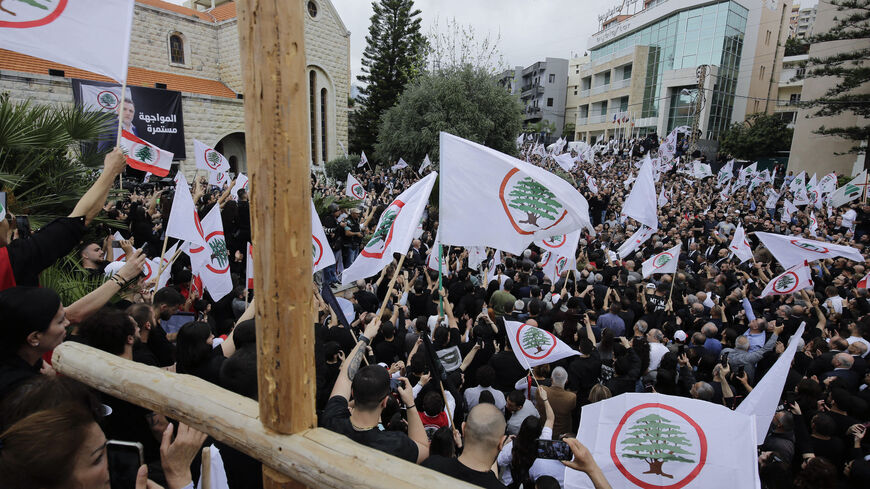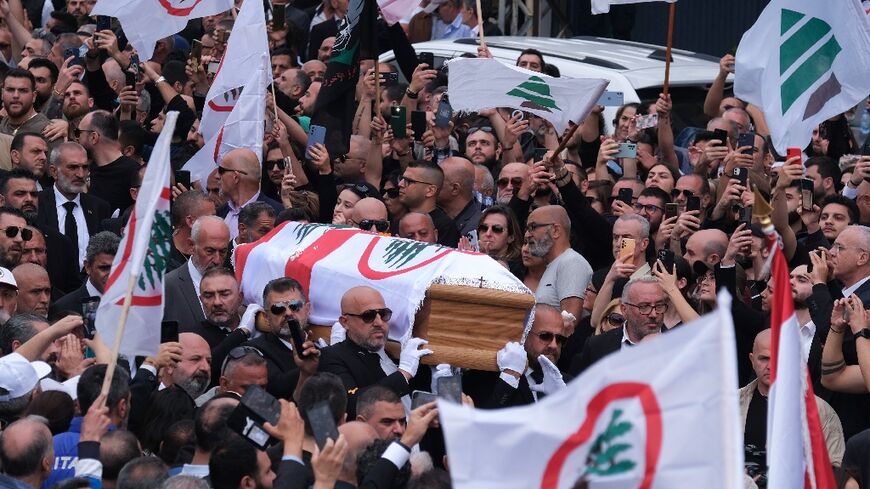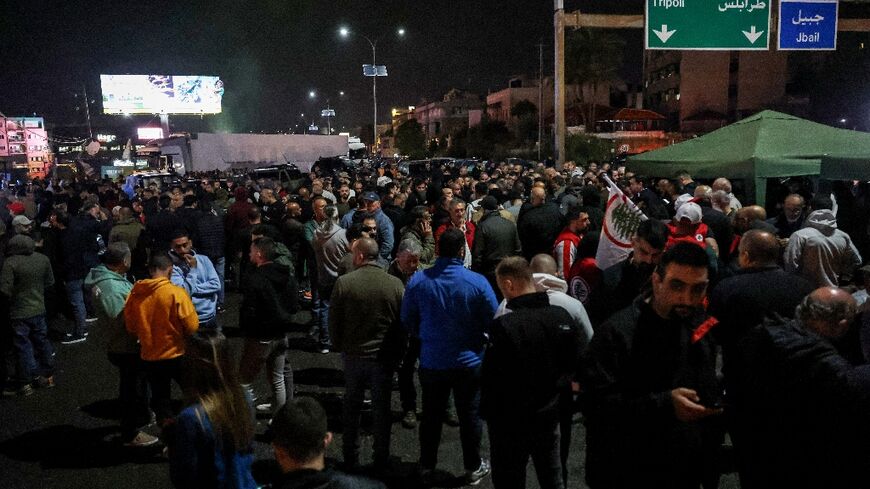After kidnapping, senior Lebanese Forces official found dead in Syria
The abduction of a local official of the Christian Lebanese Forces party risked causing sectarian strife in Lebanon, which is already reeling under the consequences of the Israel-Hezbollah conflict in the south.

BEIRUT — The kidnapping and subsequent killing of a local official of the Lebanese Forces (LF), one of the largest Christian political parties in Lebanon, over the weekend has caused outrage and sparked sectarian tensions in the country, which is already at a boiling point due to the ongoing conflict between the Shiite Hezbollah paramilitary group and Israel in the south.
What happened?
Pascal Sleiman, coordinator of the LF in the Jbeil region, was reportedly taken from his car in the region around 38 kilometers (24 miles) northeast of the capital Beirut on his way back from the town of al-Kharbeh, where he was offering his condolences to a family there. According to the official National News Agency (NNA), four armed men driving a white Subaru blocked Sleiman’s path on the mountainous road on Sunday afternoon before abducting him.
After announcing the arrest of several Syrians involved in the kidnapping throughout Monday, the Lebanese army said in a post on X that Sleiman was killed by his kidnappers while they were trying to steal his car, and his body was taken to Syria.
A WhatsApp voice note by Sleiman’s friend who was on the phone with him during the kidnapping widely circulated on social media. The friend allegedly said he heard Sleiman begging for his life, telling the assailants, “I have children, please don’t kill me” before the line was cut off.
The army added that it is currently working with the Syrian authorities to retrieve his body and investigations are ongoing.
Simmering tensions
As soon as news of Sleiman’s death emerged, angry residents took to the streets in Jbeil city, burning tires and blocking roads. Videos circulating online showed angry protesters smashing cars with Syrian license plates.
Lebanon hosts nearly 1.5 million Syrians who have fled the war in neighboring Syria since 2011, according to government estimates. Some 815,000 are officially registered at the UNHCR.
Tensions between the local population and Syrians have always been high, as many refugees face almost daily discrimination and abuse amid growing anti-Syrian sentiment across the country. Many Lebanese blame Syrians for straining the tiny country's economic resources and for a spike in crimes across the country.
تكسير السيارات التي تحمل نمر سورية في منطقة #جبيل pic.twitter.com/opCeiUSv6N
— هنا لبنان (@thisislebnews) April 8, 2024
In a statement, the LF called on merchants, municipalities and mayors in the Jbeil district to close all businesses on Monday in condemnation of Sleiman’s kidnapping.
Samir Geagea, head of the LF, headed to the party’s office in Mastita (Jbeil) a little before midnight on Sunday to follow up on the case.
LF supporters were quick to blame Hezbollah for Sleiman’s disappearance.
His kidnapping brought back to mind the suspicious death of another LF official last year.
Elias Hasrouni, member of the LF central council and former coordinator of the party in the Bint Jbeil district in the south, was found dead in his car in Ain Ebel, a Christian village in the Shiite-dominated south, last August in what appeared to be a car accident. The party, however, disputed the narrative, claiming that he was kidnapped and killed.
Video footage at the time showed that Hasrouni’s car was intercepted by several SUVs and escorted away to another location. Security sources had revealed to local media back then that Hasrouni’s body was found buried, with signs of beating and strangulation.
Hezbollah chief Hassan Nasrallah denied that his group was behind Sleiman’s disappearance. In a televised speech aired on Monday, Nasrallah said the incident and the ensuing accusations were major, especially since they coincide with the upcoming anniversary of Lebanon’s civil war that erupted April 13, 1975.
“To those who accuse us of holding the decision of war and peace [in the country], we ask them, 'Who launched the war then? Did you get approval from the state or did you make your own decision?’” he said, referring to the Kataeb Party’s attack against a bus carrying Palestinian refugees in 1975, which sparked the civil war that would go on until 1990.
Nasrallah said the LF and their allies rushed to point the finger at Hezbollah regarding Sleiman’s kidnapping.
“We heard statements reminiscent of the civil war,” he said, adding that the accusations and threats his group received amount to a “very, very dangerous development,” and those who attempted to sow strife must understand the danger behind their moves.
For his part, Lebanon’s Grand Jaafarite Mufti Sheikh Ahmed Qabalan (Jaafari is one of the largest sects of Shiism) condemned the kidnapping, saying no political party is behind this “crime.”
He further warned against instigating sectarianism, while calling for calm to avoid strife.
Meanwhile, several political parties and officials condemned Sleiman’s kidnapping.
Sami Gemayel, head of the Kataeb (Phalanges) Party, which is allied with the LF, described the incident as a “very dangerous development.” In a post on X, he called on all security services to quickly reveal the incident's circumstances.
The Free Patriotic Movement (FPM), a long-standing rival of the LF, also denounced the incident. In a press statement, the FPM urged authorities to secure Sleiman’s release as soon as possible.
The relations between the LF and Hezbollah had always been strained in the past. More recently, tensions reached their peak after Hezbollah engaged in cross-border fighting with Israel in October in solidarity with Hamas and the Palestinians in the Gaza Strip. Geagea repeatedly condemned Hezbollah’s actions in the south and accused the party of dragging Lebanon into an unwanted war.
This developing story has been updated since first publication.






